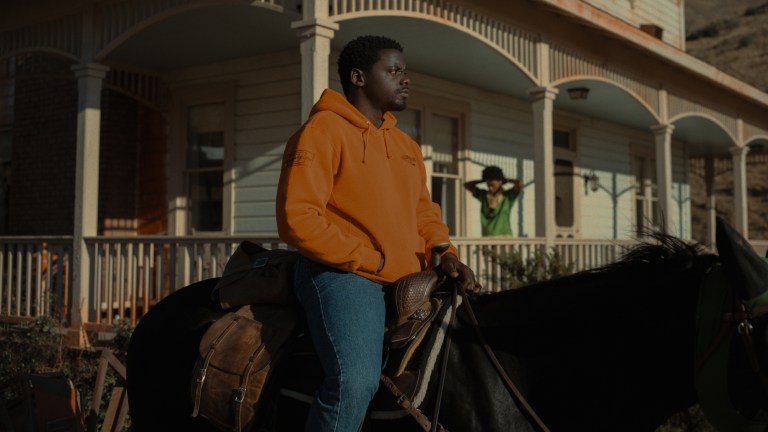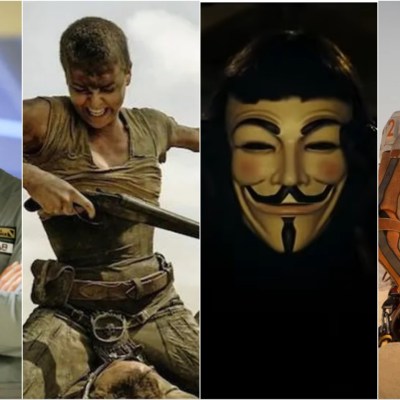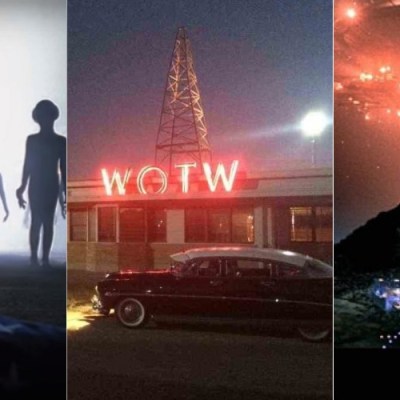Nope Review: Jordan Peele and Daniel Kaluuya Channel Steven Spielberg
Jordan Peele channels some Spielbergian riffs in Nope, but the bigger the scale, the fuzzier the picture.

With his debut feature, Get Out, Jordan Peele reinvented himself as a groundbreaking genre director/writer with an almost uncanny sense of how to balance the horrific with the socially conscious, while adding a nice dash of edgy humor as well. His second feature, Us, was more ambitious conceptually yet perhaps not quite as sharp thematically, although the film was still largely effective, unpredictable, and managed to stick the landing.
In his third film, Nope, Peele leans more fully into science fiction (with horror flavoring) and also aims for his most visually ambitious film yet – a “spectacle,” as all the early social media reactions seemed almost programmed to call it. Yet the bigger the scope, the hazier the picture: like the clouds that play an ominous role in the movie as they hover above its California desert setting, Nope becomes more shapeless as it goes on, with a third act that borders on incoherence.
Get Out star Daniel Kaluuya reunites with Peele as OJ, whose family has owned and operated Haywood’s Hollywood Horses for generations. The company provides trained horses for movies and commercials, and is the only Black-owned business of its kind in the industry. OJ runs the business with his father Otis (Keith David, seen all too briefly) and his sister Emerald (Keke Palmer) before tragedy befalls the family.
The incident is explained away, but it’s only the start of a series of inexplicable occurrences that seem to be happening around the Haywood ranch. It soon becomes apparent – at least at first – that the area is the center of strange activity, with a massive saucer-shaped object swooping out of the clouds to cause damage and occasionally vacuum up one of the Haywoods’ horses. But not all is what it seems, as the Haywoods – with the help of an overeager electronics store technician named Angel (Brandon Perea) — learn more about the invader and what it’s there for.
For a while, Nope is fun – if a bit leisurely — as the viewer tries to put the puzzle pieces together. The movie opens with a strikingly eerie scene of a blood-covered chimpanzee wandering around what looks like the set of a TV sitcom, with bodies on the floor nearby. The enigmatic scene is connected later to a character named Ricky “Jupe” Park (Steven Yeun), a child star turned entrepreneur who runs Jupiter’s Claim, a modest Western-themed amusement park near the Haywards’ ranch.
The whitewashed images of the Old West presented by Jupe provide a contrast to the secret history of Hollywood represented by the Haywoods, most significantly by the fact that they claim their great-great-grandfather played a key role in the development of cinema itself. These ideas and the characters who embody them – the forgotten child star trying to make a buck, the craftspeople of color who have delivered specific services behind the scenes for decades and are now trying to stay relevant – make Nope as fresh at the outset as Peele’s earlier efforts.
But balancing these ideas with the main sci-fi story is where Nope falls out of the saddle. As several online commentators have noted, the initial stretch of the film seems in part to be channeling Steven Spielberg circa Close Encounters of the Third Kind, but it then changes into another Spielberg film down the homestretch. The problem is that it fails to make that transition successfully, leaving a lot of squandered ideas, plot holes, and logical gaps in its wake. Nope wants to be a big movie and even comments on the very concept of big movies, but never successfully unites and develops its themes.
Read more
On the other hand, for a movie at least partially about the people we don’t often recognize for their contributions to filmmaking, the craftspeople below the line really shine on this picture. Cinematographer Hoyte van Hoytema – who’s worked with Christopher Nolan on his last few films – collaborates with Peele here for the latter’s most visually breathtaking film yet (it’s shot on 65mm and with IMAX cameras, making this a true big-screen experience).
The vast California skies, the implacable mountains surrounding the Haywood ranch, and the clouds hovering above them all provide both a sense of space and entrapment, while the scenes in which the invader attacks – including one grisly, truly terrifying showstopper in the middle of the film – are as visceral and immersive as possible. Also immersive is Michael Abels’ score, which combines modern electronics with the more traditional orchestral strains of the kind of blockbuster Peele is channeling.
The performances are mixed. Kaluuya has a number of great moments, his disappointment, grief, and world-weariness giving way to moments of stark fear and courage, but there are also times when he seems strangely detached, as if he’s trying to work out the story as he goes. Palmer is all movement and electricity as Emerald, who craves the Hollywood spotlight as much as her brother shies away from it, and the two share an easy chemistry as siblings.
Perea makes for an enjoyable enough nerd, his conspiracy-theorist bravado hiding a broken heart and retail-worker malaise, but Michael Wincott is largely wasted as a grizzled, growling, oddball cinematographer whose main function seems to be merely to provide the Haywoods with a camera. Like Yeun, whose traumatized Jupe’s character arc is never satisfactorily resolved, Wincott is introduced early in the movie but doesn’t get the payoff or development he deserves.
As for the film’s menace, which we won’t spoil here, let’s just say that we can tell when a movie isn’t working for us when we start to formulate our own ideas – while still watching the picture – of how the thing and its story could be better handled. Like many aspects of Nope, it seems like a few more passes at the script might have been necessary to create a better idea of what the Haywoods are facing and perhaps merge it more successfully with the other themes at work.
While there’s no question that Jordan Peele is a tremendously talented filmmaker with some fascinating ideas and a true love of the genres he’s working in, this one stumbles like a horse making its way down a steep ravine. The location, the sound and production design, the initial setup, the unique characters, and the visual language here are all proof of the talent at work here. We just wish we could say “yep” to the rest.
Nope is out in theaters this Friday, July 22.


